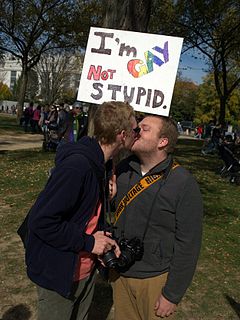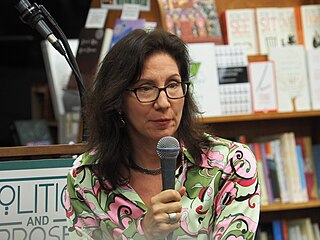Related Research Articles

Anal sex or anal intercourse is generally the insertion and thrusting of the erect penis into a person's anus, or anus and rectum, for sexual pleasure. Other forms of anal sex include fingering, the use of sex toys for anal penetration, oral sex performed on the anus (anilingus), and pegging. Although anal sex most commonly means penile–anal penetration, sources sometimes use anal intercourse to exclusively denote penile–anal penetration, and anal sex to denote any form of anal sexual activity, especially between pairings as opposed to anal masturbation.
Medicalization or medicalisation is the process by which human conditions and problems come to be defined and treated as medical conditions, and thus become the subject of medical study, diagnosis, prevention, or treatment. Medicalization can be driven by new evidence or hypotheses about conditions; by changing social attitudes or economic considerations; or by the development of new medications or treatments.

Terms used to describe homosexuality have gone through many changes since the emergence of the first terms in the mid-19th century. In English, some terms in widespread use have been sodomite, Sapphic, Uranian, homophile, lesbian, gay, effeminate, queer, homoaffective, and same-sex attracted. Some of these words are specific to women, some to men, and some can be used of either. Gay people may also be identified under the umbrella terms LGBT.
Bareback sex is physical sexual activity, especially sexual penetration, without the use of a condom. The topic primarily concerns anal sex between men who have sex with men without the use of a condom, and may be distinguished from unprotected sex because bareback sex denotes the deliberate act of forgoing condom use.

Male prostitution is the act or practice of men providing sexual services in return for payment. It is a form of sex work. Although clients can be any gender, the vast majority are male. Compared to female prostitutes, male prostitutes have been far less studied by researchers.

A glory hole is a hole in a wall or partition, often between public lavatory cubicles or adult video arcade booths and lounges, for people to engage in sexual activity or observe the person in the next cubicle while one or both parties masturbate, tea-bag or fellate.

LGBT themes in comics are a relatively new concept, as lesbian, gay, bisexual, and transgender (LGBT) themes and characters were historically omitted from the content of comic books and their comic strip predecessors due to anti-gay censorship. LGBT existence was included only via innuendo, subtext and inference. However the practice of hiding LGBT characters in the early part of the twentieth century evolved into open inclusion in the late twentieth and early twenty-first centuries, and comics explored the challenges of coming-out, societal discrimination, and personal and romantic relationships between gay characters.

Homosexuality is romantic attraction, sexual attraction, or sexual behavior between members of the same sex or gender. As a sexual orientation, homosexuality is "an enduring pattern of emotional, romantic, and/or sexual attractions" to people of the same sex. It "also refers to a person's sense of identity based on those attractions, related behaviors, and membership in a community of others who share those attractions."

Sexuality in transgender individuals encompasses all the issues of sexuality of other groups, including establishing a sexual identity, learning to deal with one's sexual needs, and finding a partner, but may be complicated by issues of gender dysphoria, side effects of surgery, physiological and emotional effects of hormone replacement therapy, psychological aspects of expressing sexuality after medical transition, or social aspects of expressing their gender.
Sexual slang is a set of linguistic terms and phrases used to refer to sexual organs, processes, and activities; they are generally considered colloquial rather than formal or medical, and some may be seen as impolite or improper.
Sexual meanings are the meanings that are attributed, by a particular cultural-social-historical context, to sexual acts and broadly to all the aspects of the erotic dimension of squares human sexual experience. This also include the beliefs on what is considered sexual and what is not. Sexual meanings are social and cultural constructs, and they are metabolized and subjectivized by the individual only after cultural and social mediation.
Tamsin Elizabeth Wilton was an English lesbian activist, and the UK’s first Professor of Human Sexuality. She researched and wrote extensively about gay and lesbian health, the process of transitioning to lesbianism, and the marginalisation of lesbian issues within sexuality studies.
Culture, Health & Sexuality is a peer-reviewed, multidisciplinary academic journal that publishes multidisciplinary articles analyzing the relationship between sexuality, culture, and health; health beliefs and systems; social structures and divisions, and the implications of these for sexual health and individual, collective, and community wellbeing. First published in 1999, it is the official journal of the International Association for the Study of Sexuality, Culture and Society. The editor-in-chief of Culture, Health & Sexuality is Peter Aggleton.
Rosalind Pollack Petchesky is an American political scientist, and Distinguished Professor of Political Science at Hunter College, City University of New York. She is the founder of the International Reproductive Rights Research Action Group (IRRAG).
Sarah Jane Salazar, born Marissa Reynon, was a Filipino AIDS activist and educator and the second Filipino to go public with HIV at age 19 in 1994 . The first was Dolzura Cortez.
Sexophobia is the fear of sexual organs or sexual activities and, in a larger sense, the fear of sexuality. As such, it can be applied to the attitude of a person based on their educational background, personal experience, and psyche, or to general stigmatization from collective entities like religious groups, institutions and/or states.

Meg-John Barker is a writer, writing mentor, creative consultant, speaker, and independent scholar. They have written a number of anti self-help books on the topics of relationships, sex, and gender, as well as the graphic non-fiction books, Queer: A Graphic History and Gender: A Graphic Guide, and the book The Psychology of Sex. They are the writer of the relationships book and blog Rewriting the Rules, and they have a podcast with sex educator Justin Hancock.
Cleo Manago is an African American activist and social architect who coined the term same gender loving as an alternative for African descended or black people who do not wish to identify as gay or lesbian due to the perceived Eurocentric nature of the latter terminology and community practices. Along with his activism, he is also a blogger and columnist. Manago rejects the terms gay, bisexual and lesbian because he believes they are white, eurocentric-constructed identities which do not culturally affirm the culture and history of African descended people. Manago is also the founder and CEO of AmASSI Health and Cultural Centers and Black Men's Xchange (BMX).

Jennifer Hirsch is a professor at the Mailman School of Public Health at Columbia University. She is the deputy chair for doctoral studies in the Department of Sociomedical Studies, and co-director of Columbia's Center for Population Research. Hirsch also co-directs the Sexual Health Initiative to Foster Transformation. Her work spans topics such as gender, human sexuality, and public health. Her book, A Courtship After Marriage: Sexuality and Love in Mexican Transnational Families, which has been used widely in college classrooms, explores the lives of Mexican women in Atlanta and rural Mexico, with a focus on changing ideas of marriage among Latinx couples. Hirsch serves on the Board of Directors of Jews for Racial and Economic Justice and is a member of B'nai Jeshurun

Beyond Carnival: Male Homosexuality in Twentieth-Century Brazil is a book by historian James N. Green published by the University of Chicago Press in 1999. The book details the development of the homosexual subcultures that developed in Rio de Janeiro and São Paulo, specifically regarding gay men.
References
- ↑ Parker, Richard Guy (1999). Beneath the Equator: Cultures of Desire, Male Homosexuality, and Emerging Gay Communities in Brazil. Routledge, an imprint of Taylor & Francis. ISBN 978-1136669958. OCLC 38765158.
- 1 2 3 Columbia faculty page (accessed 27 September 2014).
- ↑ Editorial Board of Global Public Health, Taylor & Francis online web site (accessed 27 September 2014).